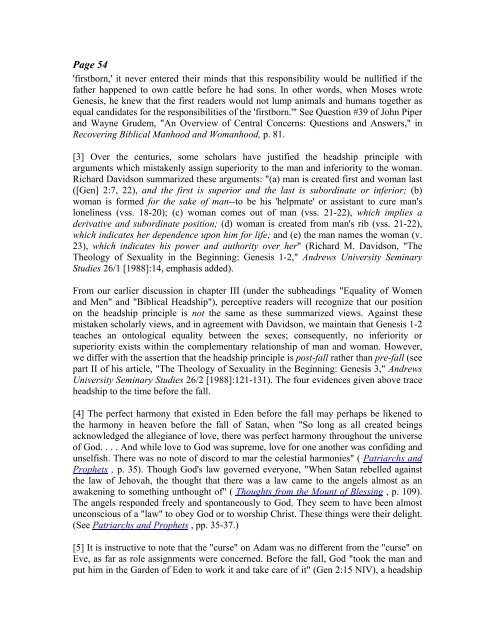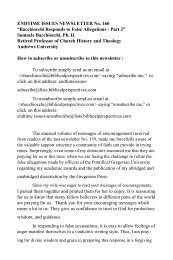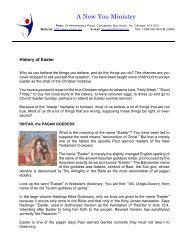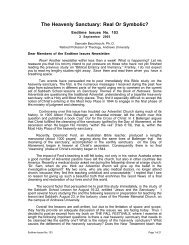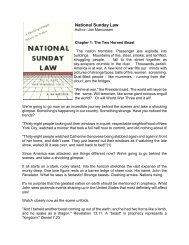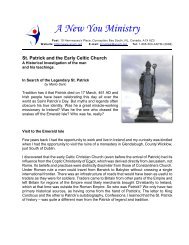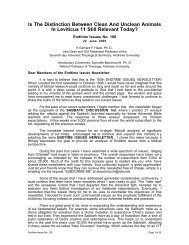Searching the Scriptures - Samuel Pipim
Searching the Scriptures - Samuel Pipim
Searching the Scriptures - Samuel Pipim
- No tags were found...
Create successful ePaper yourself
Turn your PDF publications into a flip-book with our unique Google optimized e-Paper software.
Page 54'firstborn,' it never entered <strong>the</strong>ir minds that this responsibility would be nullified if <strong>the</strong>fa<strong>the</strong>r happened to own cattle before he had sons. In o<strong>the</strong>r words, when Moses wroteGenesis, he knew that <strong>the</strong> first readers would not lump animals and humans toge<strong>the</strong>r asequal candidates for <strong>the</strong> responsibilities of <strong>the</strong> 'firstborn.'" See Question #39 of John Piperand Wayne Grudem, "An Overview of Central Concerns: Questions and Answers," inRecovering Biblical Manhood and Womanhood, p. 81.[3] Over <strong>the</strong> centuries, some scholars have justified <strong>the</strong> headship principle witharguments which mistakenly assign superiority to <strong>the</strong> man and inferiority to <strong>the</strong> woman.Richard Davidson summarized <strong>the</strong>se arguments: "(a) man is created first and woman last([Gen] 2:7, 22), and <strong>the</strong> first is superior and <strong>the</strong> last is subordinate or inferior; (b)woman is formed for <strong>the</strong> sake of man--to be his 'helpmate' or assistant to cure man'sloneliness (vss. 18-20); (c) woman comes out of man (vss. 21-22), which implies aderivative and subordinate position; (d) woman is created from man's rib (vss. 21-22),which indicates her dependence upon him for life; and (e) <strong>the</strong> man names <strong>the</strong> woman (v.23), which indicates his power and authority over her" (Richard M. Davidson, "TheTheology of Sexuality in <strong>the</strong> Beginning: Genesis 1-2," Andrews University SeminaryStudies 26/1 [1988]:14, emphasis added).From our earlier discussion in chapter III (under <strong>the</strong> subheadings "Equality of Womenand Men" and "Biblical Headship"), perceptive readers will recognize that our positionon <strong>the</strong> headship principle is not <strong>the</strong> same as <strong>the</strong>se summarized views. Against <strong>the</strong>semistaken scholarly views, and in agreement with Davidson, we maintain that Genesis 1-2teaches an ontological equality between <strong>the</strong> sexes; consequently, no inferiority orsuperiority exists within <strong>the</strong> complementary relationship of man and woman. However,we differ with <strong>the</strong> assertion that <strong>the</strong> headship principle is post-fall ra<strong>the</strong>r than pre-fall (seepart II of his article, "The Theology of Sexuality in <strong>the</strong> Beginning: Genesis 3," AndrewsUniversity Seminary Studies 26/2 [1988]:121-131). The four evidences given above traceheadship to <strong>the</strong> time before <strong>the</strong> fall.[4] The perfect harmony that existed in Eden before <strong>the</strong> fall may perhaps be likened to<strong>the</strong> harmony in heaven before <strong>the</strong> fall of Satan, when "So long as all created beingsacknowledged <strong>the</strong> allegiance of love, <strong>the</strong>re was perfect harmony throughout <strong>the</strong> universeof God. . . . And while love to God was supreme, love for one ano<strong>the</strong>r was confiding andunselfish. There was no note of discord to mar <strong>the</strong> celestial harmonies" ( Patriarchs andProphets , p. 35). Though God's law governed everyone, "When Satan rebelled against<strong>the</strong> law of Jehovah, <strong>the</strong> thought that <strong>the</strong>re was a law came to <strong>the</strong> angels almost as anawakening to something unthought of" ( Thoughts from <strong>the</strong> Mount of Blessing , p. 109).The angels responded freely and spontaneously to God. They seem to have been almostunconscious of a "law" to obey God or to worship Christ. These things were <strong>the</strong>ir delight.(See Patriarchs and Prophets , pp. 35-37.)[5] It is instructive to note that <strong>the</strong> "curse" on Adam was no different from <strong>the</strong> "curse" onEve, as far as role assignments were concerned. Before <strong>the</strong> fall, God "took <strong>the</strong> man andput him in <strong>the</strong> Garden of Eden to work it and take care of it" (Gen 2:15 NIV), a headship


